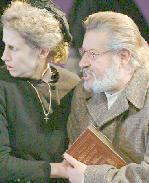SITE GUIDE
SEARCH
REVIEWS
FEATURES
NEWS
Etcetera and
Short Term Listings
LISTINGS
Broadway
Off-Broadway
NYC Restaurants
BOOKS and CDs
OTHER PLACES
Berkshires
London
California
New Jersey
DC
Philadelphia
Elsewhere
QUOTES
TKTS
PLAYWRIGHTS' ALBUMS
LETTERS TO EDITOR
FILM
LINKS
MISCELLANEOUS
Free Updates
Masthead
Writing for Us
A CurtainUp Review
The Life of Galileo
|
There is no difference between the heaven and the earth.
— Galileo
|

Sarah Sanford as Virginia and John Campion as Galileo
(Photo: Jim Roese) |
John Campion is a charismatic Galileo, eagerly exploring, hoping that scientific inquiry will replace the constraints of faith, and insisting that knowledge is won through doubt. This certainly is Campion's show.
Galileo's story is well known— how under pressure from the Church he recanted his theory, which endorsed Copernicus's work, positing that the earth travels around the sun. In the play it is chilling to watch the subtle tightening of the clergy around Galileo, even as they laugh and socialize. A scene of dressing the new Pope in pontifical raiment is similar to the famous dressing scene in The Deputy, except that in that play the Pope completely transforms as he's robed, increasingly wrapping himself in doctrine. Here the new pontiff, Barberini (Ross Manson), who has been a scientist, caves just to the point of allowing the Inquisitors to show Galileo the tools of torture, not to use them. As it transpires, the display of barbaric implements suffices.
David Howey, pristine as the Cardinal Inquisitor, has the high prelate role down cold-- the posture, the walk, the manner. He takes personally Galileo's heretical ideas: "I am not some arbitrary creature inhabiting some accidental star."
Later Galileo tells Andrea (Peter Pryor), his former pupil, that he regrets having succumbed under pressure, thus betraying his calling. But martyred men of science produce no new discoveries, and Galileo, under house arrest and closely monitored, uses stealth instead of heroics to quietly continue his work. He arranges to get a copy of his Discorsi out of the country and into the hands of waiting scientists. The text is sent on its way, hastened by a little joke about Aristotle.
The entire cast of 23, counting "the people" (chorus) does a good job. Notable is Sarah Sanford as Galileo's devout daughter, Virginia. Pete Pryor's grown Andrea is confusing at first, because he plays more than one role and looks nothing like Zac Chew, who plays the young Andrea. Funny moments abound, like the turning of tiny young Cosimo de Medici's (Dante Mignucci) chair back and forth so that he can witness an argument.
The Life of Galileo is energetically and precisely staged, supported by the large set's powerful vertical dimension. A few strong projections and signs are employed. One banner informs that Copernicus is "foolish, absurd, and heretical." There's a religious festival, with oversize masks and fine puppets. The production is highly theatrical, with pleasing arrangements of people, music, sounds, dance and song.
Although Brecht liked to light the audience along with the stage, here the house is darkened. Instead, the chorus, which inhabits Mimi Lien's elaborate scaffolding, functions as witness and surrogate for the audience sitting in the dark. Brecht appears to have softened his distancing rules for this particular work, which is more accepting of "bourgeois" sentimentality, and Blanka Zizka's directorial approach follows his lead. The actors inhabit their roles, especially Campion as Galileo.
It's marvelous that Brecht, who wanted to tear down an Aristotelian theatre aesthetic, built a work around Galileo, who aimed to overthrow Aristotle's physics. Poor old Aristotle! The Wilma's choice of The Life of Galileo is particularly apropos in the current uneasy climate of faith-based ideas vs scientific theory and exploration. I imagine Brecht would approve this political use of theater as a corrective for attempts to summon a new scientific dark age.
|
The Life of Galileo
by Bertolt Brecht Translated by David Edgar Directed by Blanka Zizka Cast: Scott Barrow, John Campion, Zac Chew, Grace Gonglewski, Scott Greer, David Howey, Anthony Lawton, Ross Manson, Dante Mignucci, Peter Pryor, Sarah Sanford, Greg Wood, John Zak; Chorus: Krista Apple, Matthew Biringer, Stedmen Croft, Bryan Davidowicz, Oscar Dubon, Keith Henley, Colleen Hughes, Sean Thompson, Josh Totora (accordian), Zura Young Set Design: Mimi Lien Lighting Design: Tyler Micoleau Costume Design: Janus Stefanowicz Sound Design and Composer: Troy Herion Mask & Puppet Design: Aaron Cromie Running time: Approx 2 hours and 40 mins with one 15 min intermission 04/11/07- 05/13/07, Opening April 18 Reviewed by Kathryn Osenlund based on 04/18 performance. Wilma Theater, Avenue of the Arts |

Easy-on-the budget super gift for yourself and your musical loving friends. Tons of gorgeous pictures.

Leonard Maltin's 2007 Movie Guide

At This Theater
Leonard Maltin's 2005 Movie Guide

 >
>

